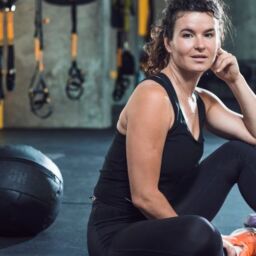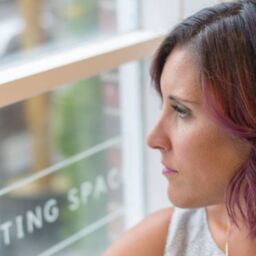
About the Podcast:
Confidence is foundational to accomplishing goals and dreams in life, but it doesn’t come easily to most women. This is due to a variety of reasons – some biological, some environmental, and some cultural. So, if you’re a woman who wants to improve her confidence, what can you do?
In this episode you’ll learn the challenges women face in developing and maintaining confidence, why confidence comes more easily to men than to women, and six things anyone can do to improve their confidence.
What You’ll Learn:
- The percentage of confidence determined by genetics and hormones
- How biological differences between men and women affect confidence
- Cultural messaging given to girls that negatively impacts their confidence
- How knowing the etymology of confidence can help you develop it
- Why feeling self-doubt isn’t a problem
- Why self-awareness, action, and self-compassion are critical to improving confidence
Featured in the Episode:
- The Confidence Code: The Science and Art of Self-Assurance – What Women Should Know by Katty Kay and Claire Shipman (affiliate link)
- Etymology of confidence
- Self Confidence Workbook by Barbara Markway, PhD and Celia Ampel (affiliate link)
- Being Well podcast with Dr. Rick Hanson and Forrest Hanson
- Do It Scared by Ruth Soukup (affiliate link)
- FREE “Feel More Confident” Cheat Sheet
- Connect with me on Instagram and Facebook
Does any of this sound familiar?
- You’re a smart, accomplished woman with advanced degrees and certifications.
- You’re detail-oriented, and you pride yourself on doing quality work.
- You have years of experience and think you should feel confident in what you do.
Despite all of that:
- You feel insecure speaking up in meetings and presenting to others.
- You hold back sharing ideas or asking questions in meetings because you’re worried what others will think of you.
- You obsess over details and worry about getting everything “just right.”
- You find yourself constantly reviewing and tweaking your work to make it a little better.
- You feel anxious and stuck when you can’t get something “just right” or when you’re not sure what “just right” is.
If that sounds like you, I want you to know you’re not alone.
If you’d like to feel more confident in your career and personal life, my FREE “Feel More Confident” cheat sheet can help. You’ll learn 3 simple steps to start feeling more confident today.
If you’d like even more help, sign up for a FREE confidence booster call with me. We’ll meet on Zoom, and in just 45 minutes, I’ll identify one of YOUR confidence blockers (it’s not the same for everyone), and I’ll tell you one thing you can do to fix it. Then, if you’re interested, I’ll share information about my one-on-one confidence coaching program. Whether you sign up or not, you’ll leave the call knowing one thing you can do to feel more confident.
Confidence doesn’t come from degrees, certifications, accolades or experience. It’s a learnable skill, and I can teach you how to have it for the rest of your life.
Schedule a free confidence booster call to get started today.
Full Episode Transcript:
Welcome to the Perfectionist Professional Woman podcast. This is episode 11, “Improving Your Confidence.”
I’m Keri Martinez. I’m a wife and mother of three children and three bonus children. I’m also a certified life coach and a member of the Church of Jesus Christ of Latter-day Saints. For a good portion of my life, I equated perfection with happiness and success. I thought that striving to be perfect and do things perfectly was the key to feeling happy and to being successful. I’ve since come to realize that perfection isn’t necessary to achieve either one of those–quite the opposite, in fact–and that has made such a difference in how I think, feel, and experience life. So if you’re a professional woman and you’d like to know how to release perfectionism so you can trade self-doubt for self-confidence, stop beating yourself up, and start enjoying your life more, then come with me. Let’s do this together.
Hello, friends and welcome! Thank you for tuning in today. This episode is going to be a good one and I think you’re going to get a LOT out of it. If you’re a woman and you struggle to feel confident in any area of your life – work, home, church, friends, time, money, health, any of it – this episode is for YOU!
Confidence is one of my favorite topics to talk about because it is foundational to everything we want to accomplish in life. When I was an elementary school teacher years ago, one of the most important skills my students could develop was learning to read. Once they could read, they could use that skill to help them learn in every other subject area. Kids that couldn’t read or couldn’t read very well were really at a disadvantage and struggled a lot more than the kids that could, so it was always a high priority for me to get my students reading at grade level.
As a teacher working with young students and later as a coach working with teachers, a foundational skill I found I needed was being able to diagnose learning difficulties and points of confusion. That skill was critical because it allowed me to adapt my instruction and coaching to meet individual needs. Before I developed and really honed that ability, my teaching was much less strategic, which also meant it was less effective.
And you can probably identify one or more foundational skills for your own job. These would be skills you need in order to do all or parts of your job, or skills that make doing your job a lot easier.
That is how I view confidence. It’s a foundational skill because it enables you to go after your dreams and live a fulfilling life. When you have confidence, it’s so much easier to pursue and stick with your goals, and when you don’t have it, you don’t even try.
I’d like you to stop and really consider that for a moment. There is probably something in your life, or maybe several somethings, that you’d like to pursue and you’re not because you’re doubting yourself. What are you not doing because you’re afraid, because you’re feeling self-doubt? What would you do if you had more confidence? Would you speak up in meetings? Would you stand up to a coworker who’s been criticizing or belittling you? Would you offer to lead a project or head a committee? Would you ask for a raise or a promotion? Would you change careers or start your own business? Would you leave your job to be a stay-at-home mom? Would you travel somewhere exotic or pay to attend a retreat you’ve been eyeing? Would you talk to your spouse about something that’s been bothering you in your relationship or would you leave that relationship? Would you set a boundary with someone in your life? Would you ask questions at church? Would you talk to someone about doubts you’re having? Would you attend more social events and introduce yourself to more people? Would you join a mother’s group, a sewing club, or a hiking club? Would you join a gym or start a fitness program? Would you start taking music or art lessons? Would you share your music or art on social media? Would you write a book or start a YouTube channel? Would you pursue a degree or certification you’ve been wanting? Would you advocate to politicians regarding issues you care about? Would you speak up and stand up to injustices you witness?
Confidence is key for doing all those things and more.
Another reason I want to address confidence on this podcast is that generally, confidence is harder for women to develop and maintain than it is for men. And it is especially difficult to develop for perfectionist women. This is due to a variety of reasons, some biological, some environmental, and some cultural. I’m not going to go into the biological reasons very much here. Suffice it to say that scientists have found various genes and hormones that account for 25 to 50 percent of your confidence. There are also distinct differences in brain matter and functioning between women and men that impact confidence. So the genetics and brain matter are hardwired from birth and to some extent the hormones are, too, but there are things you can do to impact some of your hormone levels and some of your brain functioning. If you’d like to take more of a deep dive into the genetic, hormone, and brain information aspects of confidence, I’d suggest you read the book The Confidence Code by Katty Kay and Claire Shipman. That book was really eye-opening and helpful for me, and I will put a link to the book in the show notes of this episode.
So as I said, anywhere from 25 to 50 percent of your confidence is determined by things outside your control (your genetics, your hormones, and your brain), and that leaves 50 to 75 percent within your control. This remaining percentage is affected primarily by your environment, various cultural norms, and your personal habits.
So let’s talk about those and how they impact women’s confidence. Think back to your time in school, particularly elementary school. What was really praised by your teachers? If you had an experience similar to mine, it was being “good” – not being disruptive, being quiet, raising your hand, doing your work, and not making mistakes. From an early age, we were taught not to take risks and make mistakes. We were taught to conform and seek the “right” answers. Failure was frowned upon. It still is in public schools, for the most part.
The problem with all of that is that the ability to handle risk and failure are critical to developing confidence. Let me say that again. The ability to handle risk and failure are critical to developing confidence. Despite that, girls are repeatedly given the message that we should wait until we’re ready for something before we ask for it, and we should wait until we’re certain we know the answer or have something worthwhile to say before we raise our hand to contribute. According to The Confidence Code, our biology works against us because, “Women’s hormonal tendency to avoid risk and conflict can lead to too much caution.”
I want to read a little more from The Confidence Code on the differences between men and women.
First, “We know that most women tend to talk less when we’re outnumbered. We go into a meeting, study the layout, and choose to sit at the back of the room. We often keep our thoughts, which we decide can’t be all that impressive, to ourselves. Then we get cross with ourselves when the male colleague next to us sounds smart saying the same thing that we would have said.”
Can you relate to this? I certainly can.
Next paragraph. “[A] study found that in some cases women, when in the minority, spoke 75 percent less than men did. Do we believe our words are that much less valuable? Do we think they are just as valuable, but we don’t have the nerve to spit them out? Either way, we’re underselling ourselves. The kicker is that a man in a room with mostly women talks just as much as he always does.”
Last paragraph. “Do men doubt themselves sometimes? Of course. But they don’t examine those doubts in such excruciating detail, and they certainly don’t let those doubts stop them as often as women do. If anything, men tilt toward overconfidence.”
And I find all of that so fascinating! Why can men shake off their doubts so much faster than women? I think some of it goes back to the differences between women’s and men’s brains, but some of it is probably also due to the greater freedom boys are given to explore and mess up. They’re not held to the same behavioral standards as girls. Now don’t get me wrong – boys are expected to behave in school, too, but when they don’t, you’ll often hear things like “boys will be boys.” There’s a degree of allowance for them that isn’t there for girls.
And it’s funny, I never realized this growing up. I didn’t tune in to the different messages and standards for boys and girls, but my bonus daughter did when she was in school, and she still does actually, and my other daughters do, too. They are all quick to recognize when things between men and women are off kilter, which has helped me to be more aware of it. I think societal awareness as a whole is increasing on this, which is a good thing in terms of changing the culture.
Another cultural message around confidence (at least in Western culture) is that confidence is supposed to be bold, flashy, sometimes brash and loud. Don Draper from the TV show Mad Men is often heralded as the gold standard of confidence. That style of confidence is decidedly masculine, though, which leads women to believe they have to act like men in order to display confidence. But what if you don’t want to act like one of the guys?
Well, the good news is, you don’t have to. And further good news is that even though some of the biological and cultural decks may be stacked against you as a woman, there are definitely things you can do to improve your confidence. So for the remainder of the episode, I’m going to talk about what you can do to grow your confidence, and then in the next episode I’m going to address some pitfalls you should watch out for.
The first thing you can do to improve your confidence is to have a clear understanding of what confidence is. We typically think of confidence as a feeling – it’s something you feel or you don’t, right? And when we talk about feeling confident, we usually associate it with a sense of ease, comfort, or an assurance that we’ll be successful. But I want you to think of confidence a little differently. First of all, instead of thinking of confidence as a feeling – something you feel or not – I want you to think of it as a skill. It’s something you can learn to develop over time, just like learning to play the guitar, ride a bike, or speak another language. It’s something that takes repeated practice to master.
I also want you to understand confidence in terms of its etymology. Confidence comes from the Latin prefix con which in this case means “completely” and the root fidere which means “to trust.” So its original meaning was “to trust completely.” If you had confidence, you acted with complete trust even if you weren’t certain of the outcome. Acting like confidence sounds very similar to acting with faith, right? Well, incidentally, faith comes from the same Latin root fidere meaning “to trust,” so confidence and faith are etymologically very similar.
When you think of developing the skill of confidence, I want you to think of it as developing the skill of completely trusting yourself. Trusting yourself to have your own back, no matter what. Trusting yourself to figure it out and make it through, no matter what life hands you. Trusting yourself to know what’s best for you and your life, and to be able to course correct and handle mistakes that will happen. You will make them!
If you can develop that trust in yourself, that you’ll always have your own back, it won’t matter what other people do and say about you, your work, your parenting, your beliefs, and your life choices. You won’t need praise and validation from other people because you’ll be able to give that to yourself. You’ll be able to take risks and handle failure, because you’ll know that you will take care of you, you will practice self-compassion, and you will figure out what to do next. It won’t matter if something takes longer than you expected because you’ll have your own back and you won’t beat yourself up about it. You won’t need others to tell you you’re on the right path and you’re doing it right or not, because you’ll be able to trust your own inner wisdom to figure out what’s best for you based on your values, and course correct as needed.
Two final things to understand about confidence are: 1) it doesn’t have to be flashy, as I said before, and 2) it’s not reasonable or even necessary to feel confident all the time. In the book Self Confidence Workbook, authors Barbara Markway and Celia Ampel say confidence “has more to do with inner resolve than outer bravado,” so it doesn’t need to look like Don Draper – thank goodness! The authors also say self-doubt is normal and can be healthy at times, so it’s not something you need to completely eradicate from your life. You can expect to experience self-doubt while you’re improving your confidence and know that nothing has gone wrong.
The second thing you can do to improve your confidence is to pay attention to your thoughts about yourself. Notice what your inner critic is saying. If you’re like many women, you have a strong, sometimes mean, sometimes vicious inner critic. It is hard, if not impossible, to trust someone that’s constantly bullying you. So, if you’re going to develop complete trust in yourself, which, remember, is what you’re doing when you’re improving your confidence, you’re going to need to calm and quiet your inner critic. The first step to doing that is being aware of it. Paying attention to it. Noticing it. And writing down what it says to get it out of your head and on paper.
I often listen to a podcast called Being Well with Dr. Rick Hanson and his son, Forrest Hanson, and on several episodes I’ve heard Dr. Hanson talk about the importance of self-awareness. He’s said, “With it, all problems are solvable and without it, no problems are solvable.” Changing anything about yourself must start with awareness.
Please don’t skip this step! If it seems trivial, I promise it is not. If it seems scary, that’s OK. I initially didn’t want to write down any of my thoughts about myself because some of them were so mean. I felt like if I put them on paper, that would make them more true. I didn’t want them to be true, so I didn’t want to put them on paper. But when I finally did it, it had the opposite effect. Putting them on paper helped me look at them more objectively. There’s a saying that you can’t read a label from inside a bottle, and you can’t effectively examine your thoughts from inside your head. Trust me on this. You need to get them out.
The third thing you can do to improve your confidence is to examine and question your thoughts about yourself. Look at the painful, unhelpful thoughts one by one and ask, “Is it true?” If so, how can I really know? Is it provable in a court of law? Would everyone on the planet agree? The point is to help your brain start to relax its tight grip on those beliefs.
The fourth thing you can do is to identify your core values. What is truly important and meaningful to you? Not what other people think is important and meaningful or what you think you should think is important and meaningful. What is truly important and meaningful to YOU? Is it personal freedom? Family? Love? Honoring and spending time in nature? God? Learning? Having Fun? Adventure? Integrity? Personal growth? Beauty? Creating?
Spend some time considering what you really value and then write about those values. Pick three to start and write about why you value each one and a memory of a time you embodied the value or you observed someone else embodying it.
If you’re going to develop complete trust in yourself to have your own back and figure out what’s best for you, you need clarity on the values you want to live by.
The fifth thing to do to improve your confidence is to take action on goals related to your values. Take a small step in the direction of a goal or a dream, even if you’re scared. There’s a book by Ruth Soukup (I hope I’m pronouncing her name right) and it’s called Do It Scared and I highly recommend, I highly recommend it. It’s all about this very thing.
On episode 150 of the Being Well podcast, Rick and Forrest Hanson talked about how action binds anxiety. I love the visual that sentence creates for me. Action binds anxiety. So cool! They said taking action fosters a sense of agency which then eases feelings of hopelessness and immobilization.
In another episode, episode 167, they talked about how taking action helps you believe in yourself. They said you should act so you can believe, NOT believe first and then act, and NOT act as if you believe. Act so you can believe and then keep taking action. Small, simple steps are all that’s required, especially when you’re first starting out, because small, simple steps can create big results.
In The Confidence Code, the authors said, “Nothing builds confidence like taking action, especially when the action involves risk and failure. Risk keeps you on life’s edge. It keeps you growing, improving, and gaining confidence.” They also recommended getting busy failing in little ways. They said, “We need to fail again and again, so that it becomes part of our DNA…When in doubt, act.”
The sixth and final thing you can do to improve your confidence is to practice self-compassion. As you’re taking risks, taking action, doing things that scare and challenge you, you’re going to fail. You will. That’s how life goes. So in order to calm your inner critic so you can build complete trust in yourself, you need to practice self-compassion. The authors of The Confidence Code say self-compassion “is a safety net that actually enables us to try for more and even harder things. It increases motivation because it cushions failure.” Many times we shy away from doing challenging things because we know we’ll beat the crap out of ourselves if we fail. If you can practice self-compassion, if you can give yourself a soft place to land when you fail, if you know you’re not going to be brutally attacked if you fail, you’ll be much more willing to try the hard things.
All right. That’s the episode for this week. Let’s do a quick recap of the six things you can do to improve your confidence.
- Get a clear understanding of what confidence is.
- Pay attention to your thoughts about yourself. Notice what your inner critic is saying and write it down.
- Examine and question each unhelpful belief.
- Write about your core values.
- Take action toward goals that reflect your values. Take small steps toward a goal even if you’re scared.
- Practice self-compassion.
If you’d like some additional help with step three, examining and questioning your unhelpful beliefs, you’re going to want to head to the show notes and download my FREE “Feel More Confident in Front of Others” cheat sheet. Step two on the cheat sheet has some questions that are very effective at helping your brain let go of unhelpful, negative beliefs. It’ll also give you one additional thing, a seventh thing you can do to increase your confidence, so be sure to head to kerimartinez.com/11 and grab that.
Thanks for listening to this episode of the Perfectionist Professional Woman podcast. To see show notes and a transcript, head over to kerimartinez.com/ podcast. That’s k-e-r-i-m-a-r-t-i-n-e-z dot com forward slash podcast. And while you’re there, click the link to download my free “Feel More Confident in Front of Others” cheat sheet. If you’re a woman who works in the training and development space and you’d like to feel more confident speaking up in meetings or delivering presentations and trainings at work, this cheat sheet will help you do that.
Have a beautiful week – ciao for now!













